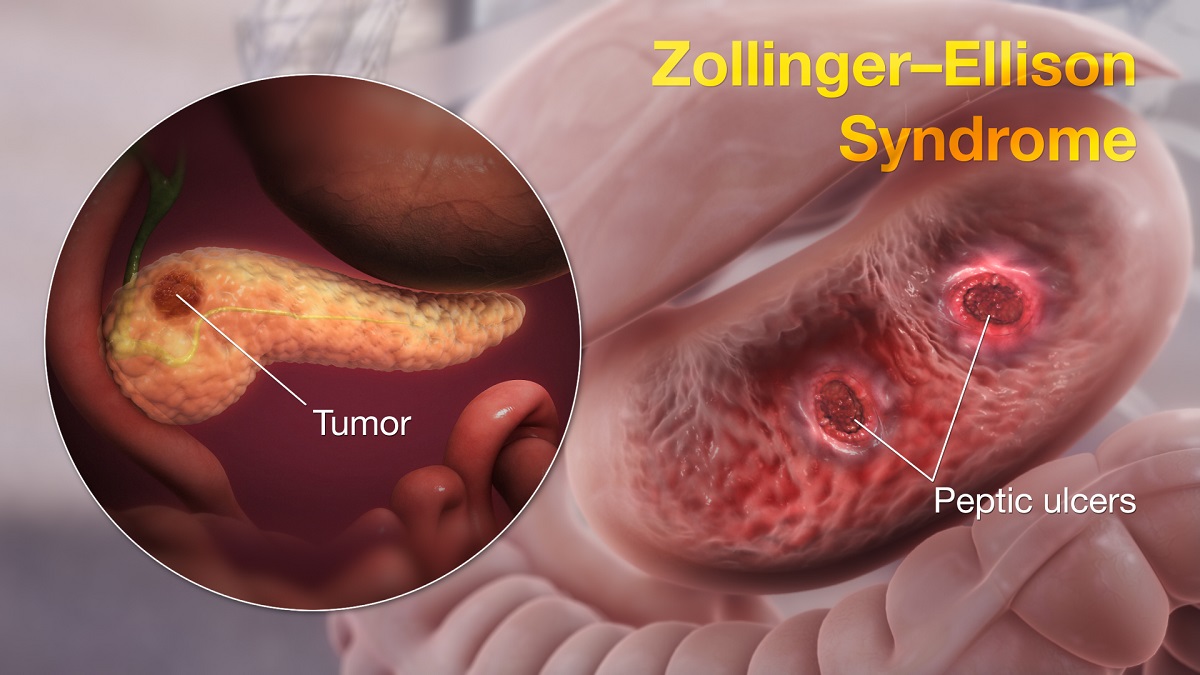Zollinger-Ellison Syndrome (ZES) is a rare digestive disorder characterized by the development of gastrin-secreting tumors, known as gastrinomas, tumors that secrete excessive amounts of gastrin, a hormone that stimulates the stomach to produce acid. This excessive stomach acid production leads to severe peptic ulcers in the stomach and small intestine, as well as other gastrointestinal complications. Affecting fewer than 1 in 100,000 people, ZES is a challenging condition that can significantly impact quality of life if not properly managed.
Gastrinomas are typically located in the pancreas or duodenum and are malignant in about 50–60% of cases, meaning they can spread to other parts of the body. ZES is often associated with a genetic condition called Multiple Endocrine Neoplasia Type 1 (MEN1), which increases the risk of developing multiple tumors in endocrine glands.
The condition was first described in 1955 by Dr. Robert Zollinger and Dr. Edwin Ellison, who identified the link between gastrinomas and excessive acid production. While rare, ZES can cause significant morbidity due to recurrent ulcers, gastrointestinal bleeding, and potential tumor metastasis. Early diagnosis and treatment are critical to managing symptoms and preventing complications.
Understanding Gastrointestinal Discomfort and Treatments that Work
Causes of Zollinger-Ellison Syndrome
The primary cause of ZES is the development of gastrinomas, which are neuroendocrine tumors that secrete gastrin. The exact cause of these tumors is not fully understood, but several factors contribute to their development:
- Sporadic Gastrinomas: Most cases of ZES (about 75–80%) occur sporadically, meaning they are not inherited and develop due to unknown genetic or environmental factors.
- Multiple Endocrine Neoplasia Type 1 (MEN1): Approximately 20–25% of ZES cases are associated with MEN1, an inherited genetic disorder caused by mutations in the MEN1 gene. This condition increases the risk of tumors in the pancreas, parathyroid, and pituitary glands. “About 1 in 4 people with Zollinger-Ellison syndrome has it as part of a genetic condition called multiple endocrine neoplasia type 1,” notes the Mayo Clinic.
- Tumor Development: Gastrinomas arise from neuroendocrine cells, which are specialized cells that produce hormones. These tumors can be benign or malignant, with malignant tumors having the potential to metastasize to the liver, lymph nodes, or other organs.
- Risk Factors: While no specific environmental triggers are confirmed, factors like chronic inflammation or other endocrine disorders may contribute to the development of gastrinomas in susceptible individuals.
Symptoms of Zollinger-Ellison Syndrome
The symptoms of ZES are primarily driven by excessive stomach acid production, which leads to severe peptic ulcers and other gastrointestinal issues. Common symptoms include:
- Abdominal Pain: The most common symptom, caused by ulcers in the stomach or duodenum. The pain is often burning or gnawing and may be relieved temporarily by eating or taking antacids.
- Heartburn and Acid Reflux: Excessive acid can cause gastroesophageal reflux disease (GERD), leading to a burning sensation in the chest or throat.
- Diarrhea: Increased acid can impair fat absorption in the small intestine, leading to frequent, watery stools. This is a hallmark symptom in about 30–50% of patients.
- Nausea and Vomiting: Ulcers and acid reflux can cause nausea, sometimes accompanied by vomiting, especially if there is gastrointestinal bleeding.
- Gastrointestinal Bleeding: Ulcers may bleed, leading to symptoms like black, tarry stools or vomiting blood. The American College of Gastroenterology advices that This is a serious complication requiring immediate medical attention
- Weight Loss and Loss of Appetite: Chronic pain, nausea, or malabsorption can lead to unintentional weight loss or reduced appetite.
- Symptoms of MEN1: In patients with MEN1, additional symptoms like hypercalcemia (due to parathyroid tumors) or pituitary-related issues may occur.
Autoimmune Disorders: Recognizing the Signs, Diagnosis, and Treatment
Symptoms can mimic other digestive disorders, such as peptic ulcer disease or GERD, making diagnosis challenging without specialized testing.
Diagnosing Zollinger-Ellison Syndrome
Diagnosing ZES requires a combination of clinical evaluation, laboratory tests, and imaging to confirm the presence of gastrinomas and rule out other conditions. The diagnostic process typically includes:
- Medical History and Physical Exam: Physicians assess symptoms, family history of MEN1, and history of ulcers or GERD. Persistent ulcers that do not respond to standard treatment may raise suspicion for ZES.
- Blood Tests:
- Fasting Gastrin Levels: Elevated gastrin levels (typically >1000 pg/mL) are a key indicator of ZES. High levels of gastrin in the blood can be a sign of Zollinger-Ellison syndrome.
- Secretin Stimulation Test: Administering secretin (a hormone) can cause gastrin levels to rise significantly in ZES patients, helping confirm the diagnosis.
- Gastric Acid Secretion Test: Measures stomach acid output, which is typically elevated in ZES.
- Imaging Studies:
- Endoscopy: Visualizes ulcers in the stomach or duodenum and allows for biopsies to rule out other causes.
- CT Scan or MRI: Identifies the location and size of gastrinomas.
- Somatostatin Receptor Scintigraphy: A specialized scan that uses radioactive tracers to detect gastrinomas, particularly useful for identifying metastases.
- Endoscopic Ultrasound: Combines ultrasound and endoscopy to locate small tumors in the pancreas or duodenum.
- Genetic Testing: For patients with a family history of MEN1, genetic testing for MEN1 gene mutations may be recommended.
Early and accurate diagnosis is critical to prevent complications like perforated ulcers or tumor metastasis.
Treatments for Zollinger-Ellison Syndrome
The treatment of ZES focuses on two main goals: controlling acid hypersecretion to manage symptoms and treating gastrinomas to prevent tumor growth or spread. Treatment plans are tailored to the individual’s condition, including tumor size, location, and whether MEN1 is present.
1. Managing Acid Hypersecretion
Excessive stomach acid is the primary driver of symptoms in ZES, and controlling it is essential to prevent ulcers and complications. Common treatments include:
- Proton Pump Inhibitors (PPIs): Drugs like omeprazole, lansoprazole, or pantoprazole reduce acid production and promote ulcer healing. High doses are often required, and long-term use is common. “Proton pump inhibitors are the most effective medicines for reducing acid production in Zollinger-Ellison syndrome,” states the National Institute of Diabetes and Digestive and Kidney Diseases (NIDDK).
- H2 Receptor Blockers: Medications like ranitidine or famotidine may be used in some cases, though they are less effective than PPIs.
2. Treating Gastrinomas
Tumor management depends on whether the gastrinomas are benign or malignant and their location. Options include:
- Surgical Removal: Surgery is the only potential cure for ZES, aimed at removing gastrinomas. It is most effective for solitary, non-metastatic tumors. However, in MEN1 patients, multiple tumors may complicate surgery.
- Chemotherapy: For malignant gastrinomas that have spread, drugs like streptozocin or 5-fluorouracil may be used to slow tumor growth.
- Somatostatin Analogs: Medications like octreotide or lanreotide can reduce gastrin secretion and control symptoms in some patients.
- Targeted Therapies: In advanced cases, therapies targeting tumor growth pathways, such as everolimus, may be considered, according to the American College of Gastroenterology.
Appendicitis: When to Seek Emergency Help
3. Managing Complications
- Treating Ulcers: Severe ulcers may require endoscopic procedures to stop bleeding or repair perforations.
- Monitoring for Metastasis: Regular imaging and blood tests are used to detect tumor spread, particularly to the liver.
- MEN1 Management: Patients with MEN1 require monitoring for other endocrine tumors, such as parathyroid or pituitary tumors.
4. Lifestyle and Supportive Care
- Dietary Modifications: Avoiding spicy, acidic, or fatty foods can reduce acid reflux and ulcer irritation. Small, frequent meals may also help.
- Stress Management: Stress can exacerbate symptoms, so techniques like mindfulness or counseling may be beneficial.
Preventing Complications and Managing Zollinger-Ellison Syndrome
While ZES cannot be prevented, early diagnosis and management can reduce complications and improve outcomes. Key strategies include:
- Regular Monitoring: Patients with ZES require lifelong follow-up with gastroenterologists and endocrinologists to monitor acid levels, tumor growth, and complications.
- Screening for MEN1: Individuals with a family history of MEN1 should undergo genetic testing and regular screenings for endocrine tumors.
- Adherence to Treatment: Consistent use of PPIs and adherence to follow-up appointments are critical to prevent ulcer recurrence and tumor progression.
- Healthy Lifestyle: Maintaining a balanced diet, avoiding smoking, and limiting alcohol can support overall digestive health.
Living with Zollinger-Ellison Syndrome: Practical Tips
Managing ZES requires a proactive approach to maintain quality of life and prevent complications:
- Track Symptoms: Keep a diary of symptoms like abdominal pain or diarrhea to identify triggers and discuss with your healthcare provider.
- Work with Specialists: Collaborate with a gastroenterologist, endocrinologist, or oncologist for comprehensive care, especially if MEN1 or malignant tumors are present.
- Stay Informed: Educate yourself about ZES using reputable sources to make informed decisions about your care.
Kidney Stones: Treatment, Prevention, Foods to Avoid, and What to Expect
Conclusion
Zollinger-Ellison Syndrome is a rare but serious digestive disorder caused by gastrinomas that lead to excessive stomach acid and severe peptic ulcers. Understanding its causes, such as sporadic tumors or MEN1, and recognizing symptoms like abdominal pain, diarrhea, and heartburn are crucial for early diagnosis. Diagnostic tools like gastrin level tests, imaging, and endoscopy help confirm the condition, while treatments, including PPIs, surgery, and chemotherapy, aim to manage symptoms and address tumors. Preventive measures, such as regular monitoring and lifestyle adjustments, can reduce complications.
What You Need to Know About Glaucoma and Blindness
Yeast Infections (Candidiasis): Causes, Symptoms, and Treatment
Rheumatoid Arthritis: Causes, Symptoms, Prevention, and Treatment


